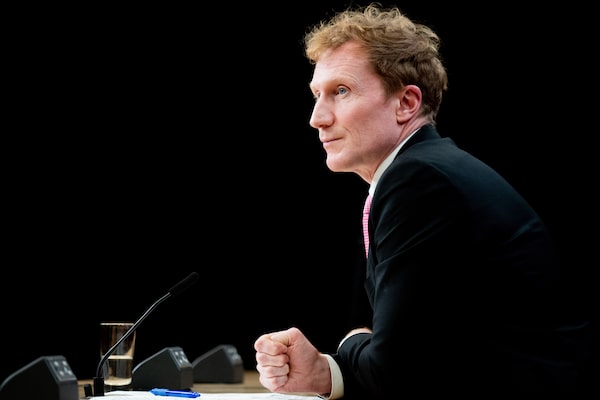
Immigration Minister Marc Miller delivers remarks at a press conference in Ottawa, on Dec. 21, 2023. Mr. Miller reiterated plans at a press conference Tuesday to clamp down on the growing number of international students.Spencer Colby/The Canadian Press
Immigration experts are calling on the government to crack down on the abuse of study permits for international students, including those gaining admission to Canada but who do not attend college or university once they get here.
Immigration, Refugees and Citizenship Canada (IRCC) is also being urged to target people applying from abroad to attend private colleges that report high levels of “no shows.”
An analysis by Statistics Canada in November found that around 19 per cent of international students with study permits did not have a record of studying at college or university here.
The Statscan report looked at international students who were not enrolled in publicly funded postsecondary education programs, which include Canada’s top universities. It compared various data sources, including tax records, to determine if those students were studying elsewhere in Canada.
Many study-permit holders were found through their tax records to be studying, likely in private colleges. But the report found no evidence that around 19 per cent of study permit holders from 2019 had enrolled in Canadian colleges or universities.
Henry Lotin, a former federal public servant and expert in immigration statistics, said in an e-mail that the Statscan report was “groundbreaking.”
“Clearly, for the integrity of, and public confidence in, the student visa program, student visa holders not actually enrolled in school should not be allowed in Canada,” said Mr. Lotin, founder of consulting firm Integrative Trade and Economics, in an e-mail.
“How many student visa holders are in Canada only to work? We do not know yet. Policy makers and stakeholders need better and more timely data on this gap, including enrolment in private colleges and universities.”
Ottawa forecasts 1.4 million international student applications a year by 2027, document shows
International student numbers have increased rapidly from 637,855 in 2019 to 807,260 in 2022. Each spring and fall, colleges and universities outside Quebec, in order to comply as Designated Learning Institutions, have to report to IRCC on the enrolment status of their international students.
The International Student Compliance Regime, implemented in 2014, is designed to help identify bogus students and help provinces identify questionable schools.
Most of the colleges on IRCC’s top ten list of schools with the highest potential non-compliance rates are privately run and in Ontario, catering heavily to students from India.
The IRCC’s Student Integrity Analysis Report, dated November, 2021, found “no shows” to make up as much as 90 per cent of students at some private colleges. “No shows” are students with letters of acceptance, who should be enrolled but either did not confirm the acceptance, never attended class or suddenly stopped attending.
The Academy of Learning College in Toronto had a 95 per cent “overall potential student non compliance rate” among students, the report said. Ninety per cent of students were recorded as “no shows.”
The 2021 Student Integrity Analysis Report, obtained by immigration lawyer Richard Kurland through an access to information request, found that Flair College of Management and Technology in Vaughan, Ont., had a “no show” of 75 per cent of students.
Both colleges did not immediately respond to a request for comment.
Mr. Kurland said the IRCC has known for years which colleges have large numbers of international students not attending classes but have so far failed to act on study permits.
He said the data suggest that some schools may have a business model based on bringing students into Canada and getting their tuition, even if the student doesn’t attend.
A 2022 Student Integrity Analysis Report, released through access to information with redacted names of colleges, said one college had no record that 64 per cent of its international students had actually enrolled there.
At another private college, whose name was also redacted, 83 per cent did not show up and 17 per cent were no longer enrolled in 2022.
The report suggests that some colleges – approved by provinces to operate as Designated Learning Institutions – with a high proportion of no shows, may be recruiting people from abroad who are not genuine students.
“Of the DLIs with the highest potential non compliance, the majority indicated their international students are ‘no shows,’ revealing that the DLI could be engaging in unethical recruitment practices that can result in the entrance of non bona fide students,” the report says.
Campbell Clark: When will Doug Ford rein in Ontario’s foreign-student industry?
The internal IRCC report suggests that for schools with high rates of no shows, there may have been “a possible targeted/organized movement.”
Earl Blaney, a registered immigration consultant from London, Ont., who obtained the 2022 report through access to information, said IRCC has “been aware for years” that some international students with study permits may not be actually studying.
“There are schools that have zero of the students at their institutions,” he said.
Immigration Minister Marc Miller reiterated plans at a press conference Tuesday to clamp down on the growing number of international students. He has warned that he would be prepared to cap the number of international students, and restrict study permits for substandard colleges.
Mr. Miller’s spokesperson Bahoz Dara Aziz said Wednesday “some provinces have allowed this issue to balloon despite repeated conversations,” adding that Ottawa has been in talks with provinces for “quite some time” about the issue.
“The integrity of our International Students Program is of the utmost importance,” she said in an e-mail.